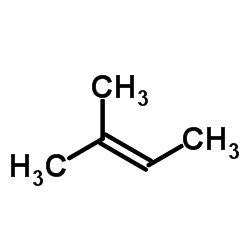2-Methylbut-2-ene

2-Methylbut-2-ene structure
|
Common Name | 2-Methylbut-2-ene | ||
|---|---|---|---|---|
| CAS Number | 513-35-9 | Molecular Weight | 70.133 | |
| Density | 0.7±0.1 g/cm3 | Boiling Point | 36.0±3.0 °C at 760 mmHg | |
| Molecular Formula | C5H10 | Melting Point | -134 °C | |
| MSDS | Chinese USA | Flash Point | -45.6±0.0 °C | |
| Symbol |




GHS02, GHS07, GHS08, GHS09 |
Signal Word | Danger | |
|
An interfacial and comparative in vitro study of gastrointestinal lipases and Yarrowia lipolytica LIP2 lipase, a candidate for enzyme replacement therapy.
Biochimie 102 , 145-53, (2014) Lipolytic activities of Yarrowia lipolytica LIP2 lipase (YLLIP2), human pancreatic (HPL) and dog gastric (DGL) lipases were first compared using lecithin-stabilized triacylglycerol (TAG) emulsions (Intralipid) at various pH and bile salt concentrations. Like ... |
|
|
Towards the fabrication of artificial 3D microdevices for neural cell networks.
Biomed. Microdevices 17(2) , 27, (2015) This work reports first steps towards the development of artificial neural stem cell microenvironments for the control and assessment of neural stem cell behaviour. Stem cells have been shown to be found in specific, supportive microenvironments (niches) and ... |
|
|
Effect of acid-catalyzed formation rates of benzimidazole-linked polymers on porosity and selective CO2 capture from gas mixtures.
Environ. Sci. Technol. 49(7) , 4715-23, (2015) Benzimidazole-linked polymers (BILPs) are emerging candidates for gas storage and separation applications; however, their current synthetic methods offer limited control over textural properties which are vital for their multifaceted use. In this study, we in... |
|
|
D1 dopamine receptors modulate cone ON bipolar cell Nav channels to control daily rhythms in photopic vision.
Chronobiol. Int. 32(1) , 48-58, (2015) In amphibians, voltage-gated sodium (Nav) channels in cone ON bipolar cells (ON-CBC) amplify cone signals in the dark and in mesopic background light. However, during light adaptation, dopamine, acting through D1 receptors (D1R), suppresses Nav channels and t... |
|
|
Angiotensin II can directly induce mitochondrial dysfunction, decrease oxidative fibre number and induce atrophy in mouse hindlimb skeletal muscle.
Exp. Physiol. 100(3) , 312-22, (2015) What is the central question of this study? Does angiotensin II directly induce skeletal muscle abnormalities? What is the main finding and its importance? Angiotensin II induces skeletal muscle abnormalities and reduced exercise capacity. Mitochondrial dysfu... |